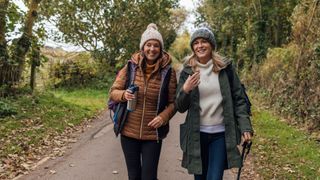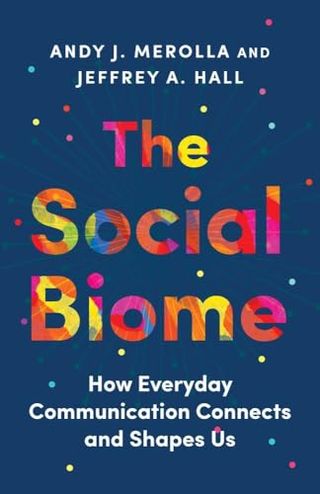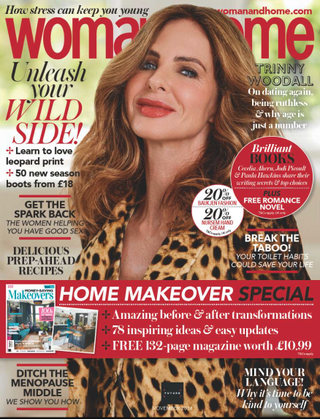Why friendships are good for your health - and 5 expert tips to boost your 'social biome'
Not much beats a belly laugh with your gal pals but there’s more to these connections than frivolous fun


Most of us are lucky enough to have friendships that see us through thick and thin. From casual acquaintances to lifelong soulmates, they are all vital to varying degrees.
The power of female friendships and that feel-good sensation we get from being with friends is borne out by research – they can help us lead longer, happier lives. Conversely, "If we don’t have people we feel we belong with, we are more likely to experience depression and anxiety, and to have poorer wellbeing," says Dr Mhairi Bowe, deputy director of the Centre for Applied Behavioural Sciences at Heriot-Watt University in Edinburgh. "When we do feel that sense of connection, we recover from illness better, we tend to adopt healthier habits, feel safer and less stressed, and we are more likely to offer help and – more importantly – accept it in return."
It’s all about having a healthy social biome – a term coined by professors of communication Jeffrey Hall and Andy Merolla. Rather like a gut biome that flourishes on a diverse diet, this is about big and small daily interactions with different people.
Yet sometimes we can feel too busy to put the effort in – after all, keeping friendships alive or making new friends as an adult can be time-consuming. If you feel as if you’re missing a sense of belonging, here’s how to boost that social biome.

How to boost your social biome
1. Find a happy equilibrium
It’s important to get the balance right between time alone and time spent with other people, say professors Hall and Merolla. "Solitude and time to recover are absolutely vital to a healthy social biome, as research shows our life satisfaction is linked with how we feel when we’re alone.
"Feeling comfortable solo is a sign that you are getting your social needs met in everyday life. Contented solitude facilitates connection and vice versa. But enjoyable interaction that promotes social connection takes a lot of emotional energy, and we need downtime to recharge our sociability batteries."
2. Start small
When it comes to meaningful interaction, people tend to think about deep disclosures and heart-to-heart chats, explains Professor Hall, but lots of types of conversations can be meaningful. "Taking time to catch up, joke around or show appreciation for someone feels good, and lowers stress and loneliness," he says.
Sign up for the woman&home newsletter
Sign up to our free daily email for the latest royal and entertainment news, interesting opinion, expert advice on styling and beauty trends, and no-nonsense guides to the health and wellness questions you want answered.
Start small, such as sharing something that made you laugh, then move on over time to more heartfelt topics. Opening up allows for deeper connections, and fosters a sense of closeness that brings comfort and support.

3. Talk to the woman on the bus
"Studies have found that talking to strangers in everyday places such as on trains and in coffee shops can boost your wellbeing," says Professor Hall. "Part of the reason they may be beneficial is that they increase the number of conversations we have. The research on wellbeing and social interaction shows that both quality and quantity matter.
"Frequent interactions with acquaintances and strangers are associated with less loneliness and higher life satisfaction. One set of researchers found that the happiest people spent twice the amount of time in the company of people (70%) than the least happy (37%)."
Remember, these interactions only need to take a few seconds to be valuable.
5. Discover the communications ladder
There are different levels of connection and it can be useful to think of it like climbing a ladder. "The lowest rung might be looking at what friends and family have posted on social media (and giving likes and comments). Online people watching, such as looking at social media, can be a good way to keep involved with the people you care about," says Professor Hall.
"Next comes messaging with small groups or one-on-one. Phone and video calls can be a good substitute for lost face-to-face conversations, but in-person connections are at the top of the communication ladder, fostering a sense of belonging."

The Social Biome: How Everyday Communications Connects and Shapes Us by Jeffrey Hall, professor of communication studies at the University of Kansas, and Andy Merolla, professor of communication at the University of California, Santa Barbara, is out in February 2025.

Boost your friendship circles
"If you are feeling less connected than you'd like to be, it can be helpful to reflect on what might be getting in the way," explains Ashley Duncan, a registered counsellor at the British Association for Counselling and Psychotherapy (BACP). "It may be that you need to deliberately invest in your social life."
To do so, try one of these suggestions:
- Reignite an old passion or start something new – Things like painting, yoga or cookery will introduce you to new people. Check your local authority website for adult education classes.
- Join a community group – A local wildlife garden or park may have a volunteer group, or there might be an am-dram society or choir you could join. Search Facebook for groups in your area and keep an eye out for posters in shops.
- Explore Meetup – This free online platform links up people who share an interest. Someone might be organising a hike, a theatre outing or a book group in your area.
- Strengthen existing bonds – Ask your neighbours over for a cup of tea, invite a colleague to do something fun outside of work or contact friends you’ve lost touch with. It may lead to meeting up more often but even if it’s just a one-off, socialising will do you all good.
‘My mental health has transformed’

Monaz Parry, 42, from Kent, realised how important friendships were during the COVID-19 pandemic. She says: "When my dad died during lockdown, I was left dealing with my grief and coping with a new baby while feeling isolated, lost and anxious. It made me realise how much I needed people.
"When restrictions eased, I joined a local Zumba class, and everyone was so welcoming. I also went to a local music festival with a group of mums I didn't know very well, which expanded my friendship group. I got chatting to one of the other mum’s husbands about music – we even went on to start a band together, called prismatiqk. It’s an amazing way to meet people, as everyone wants to talk to you about the music.
"People began to say ‘you look different, you look happier'. Being with people and having shared experiences has completely transformed my mental health. I feel like myself again."

This article first appeared in the November 2024 issue of woman&home magazine. Subscribe to the magazine for £6 for 6 issues.
Continue reading
Julie Powell is a hugely experienced health and wellness writer and editor. Over the past 30 years, she has worked for national newspapers, BBC radio, expert-led health apps and a range of well-known women's magazines including Simply Woman & Home, Women’s Weekly, Good Housekeeping, Red and Prima. She has written about both physical and emotional wellbeing, covering everything from the power of female friendships and how to give your marriage a midlife makeover to sexual health for grown-ups, perimenopause, positive ageing and breast cancer.
-
 Midsomer Murders Wild Harvest spoiler: Who was the killer and why did they commit such grisly crimes?
Midsomer Murders Wild Harvest spoiler: Who was the killer and why did they commit such grisly crimes?I’ve been a huge Midsomer Murders fan for so many years I’ve lost count and Wild Harvest is an episode that still stands out to me.
By Emma Shacklock Published
-
 Let’s celebrate what unites us – it could help bring us together
Let’s celebrate what unites us – it could help bring us togetherWe’ll be a happier society if we do, argues coach, consultant and podcast host Elizabeth Oldfield
By Elizabeth Oldfield Published



